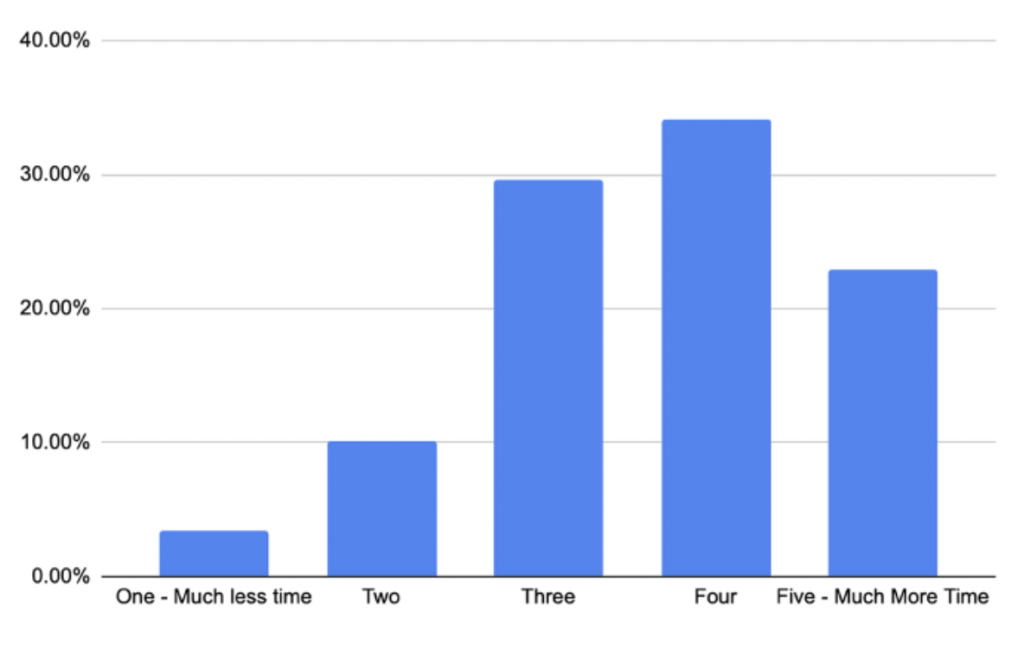Tuesday, November 29, 2022
Writing a book is a major endeavor. When you reach the end, like the traveler after a long journey, you look for the stories or lessons in the experience to share with others.
Those stories hold wisdom that applies beyond writing.
I’ve written six books, and coached or supported many authors on theirs. A few patterns emerge from these varied experiences—simple lessons that apply to all kinds of endeavors.
Here are the top three lessons I’ve absorbed from working as an author and book coach. Perhaps they’ll resonate with you as well.
Rule 1. Honor the time it takes
Writing a worthwhile book, like most meaningful work, requires time.
Perhaps you can write a book in a weekend, but should you? You’ll likely cheat both yourself and your reader if you do so.
In my survey of over 400 nonfiction authors, more than half said that writing their book took longer than they expected.
 Survey: How much time did it take you to write your book?
Survey: How much time did it take you to write your book?Why is this? Are nonfiction authors rotten planners?
All human beings are terrible at planning complex projects. It’s the planning fallacy in action — we can’t envision the many unexpected ways things go wrong.
Sometimes, the delays make a positive long-term impact.
- We realize we need more research or uncover a new angle to explore
- Feedback from early readers leads us to expand or change the content
- Revision and editing takes more time than we planned
These activities improve books. We should not resent the time they take.
When you acknowledge and give tasks the time they deserve, you’ll avoid rushing into careless mistakes.
My mantra: This will take as long as it needs to—not longer.
Rule 2. You can’t control everything
The longer your writing project, the greater the chances that the world will intervene.
You might have to put your work aside if you get sick, or if a fantastic opportunity arises. We can’t control an uncertain world.
We also rely on other people who face the same uncertainties. Too often, our planning doesn’t account for their schedules:
- A subject-matter expert is slow to respond to questions
- Your early readers are busy and take a long time to deliver feedback
We often assume everyone will drop everything and work full-tilt on our project without experiencing their own scheduling glitches. Best-case scenario planning rarely plays out.
When publishing, a small team of people may be involved in your book. You want others involved in your project to observe rule #1: giving the work the time it deserves, rather than rushing through it.
How do we live in a world where things outside our control take too much time?
Ease up on the pressure and assume that something will take longer than it should. Plan for obvious delays and glitches ahead of time. Have a Plan B (and C, and D). Leave time in the schedule for the unexpected.
Yes, set deadlines. But when you accept, with certainty, that something will inevitably delay your deadline, good things happen.
- You’ll relax. You might even enjoy the process.
- You’ll have better relationships with others. People prefer working with someone who is not in crisis mode.
- If everything goes to the original plan, you’ll be pleasantly surprised.
Rule 3. Be impatient for the work, not the result.
As a book coach, I often talk with people as they embark on writing their books. These writers generally fit into two groups:
- Some are eager to get to writing. They have pages of notes and ideas bubbling up in their heads.
- Others show up with aggressive schedules and a sense of urgency to be done and published, but see the work ahead as daunting.
Those in the first group generally meet their schedules, or come close. Their projects move quickly.
Those in the second group are at risk. In this mindset, almost anything can knock them off their course. Inevitable delays discourage them, because they are impatient to be done, rather than doing.
Writing goes quickly when you’re committed to the process, not when you’re impatient.
Aspiring authors in the second group may simply need to shift their mindset and get excited about the work. Or, they may need time to feed and incubate their idea, like a sourdough starter.
Applying writing lessons to life
Not to get too philosophical, but these maxims apply pretty well to the rest of life. Try them out:
Rule #1: When doing a tedious but important task, honor the time it requires. Remind yourself: This will take as long as it needs.
Rule #2: Accept and plan for uncertainty beyond your control. Create contingency plans so that glitches don’t become crises.
Rule #3: When you focus on the process instead of the result, you may find joy in the journey. Oddly enough, you may finish more quickly.
These rules help me with all kinds of tasks, from doing the careful, detailed work of publishing books to the long-term effort of building and sustaining relationships. See what they do for you.
Related Reading
Read the results of the Nonfiction Author Survey.
Cuesta Park Consulting & Publishing publishes books and online courses for writers and marketing professionals. Books are available in print, ebook, and audiobook formats from a wide range of retailers. For more information, visit AnneJanzer.com.